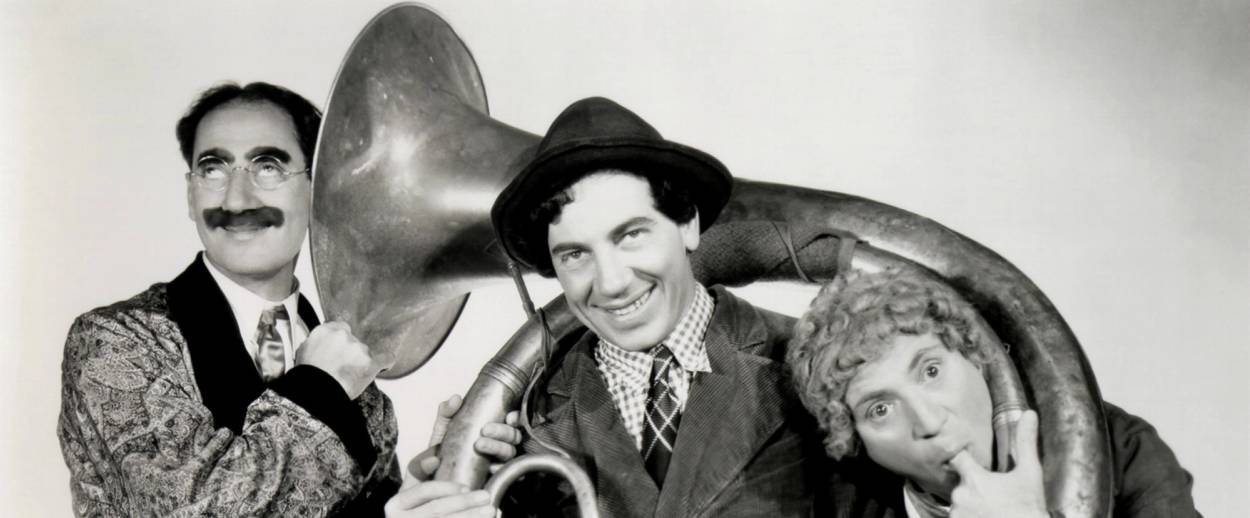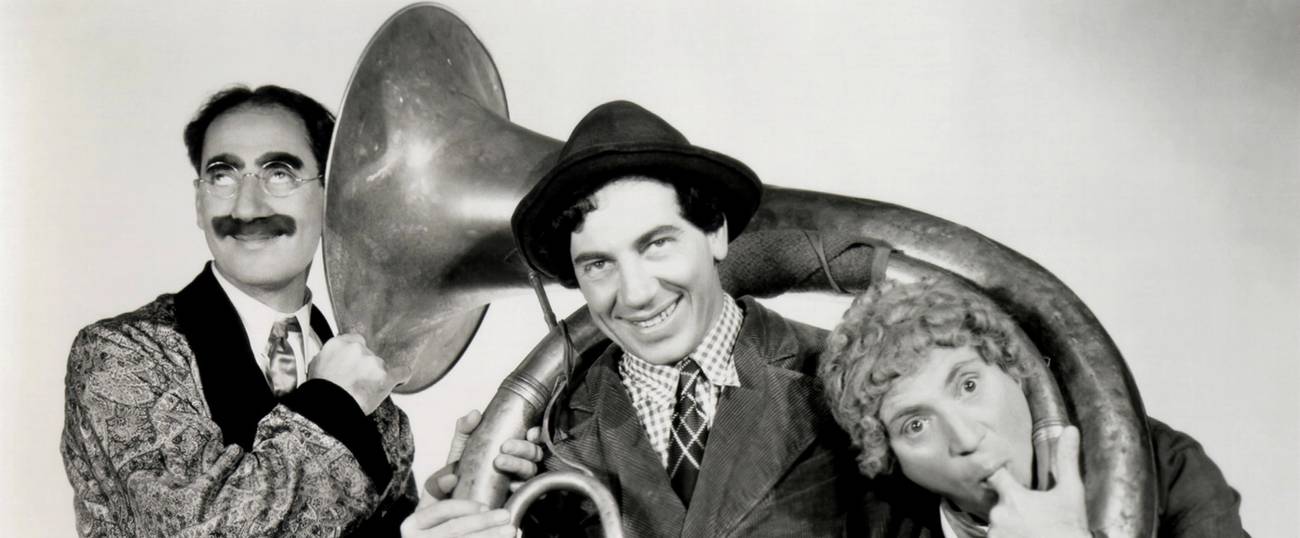What to Watch This Weekend: ‘A Night in Casablanca’
The Marx Brothers’ finest film is a testament to the indestructibility of Jewish humor




Every Friday, our resident film fanatic Alex Aciman will dig deep into the pile of cinematic masterpieces and fish out one forgotten classic you should watch soonest.
Even if you grew up in a New York household amid reminders to bring a sweater and to eat more and relatives quipping at each other in Marx Brothers rejoinders full of reversals and coded obscenity and deep down a sort of world-weariness, there is still a good chance you missed their 1946 film A Night in Casablanca. Released more than 10 years after many of the works that made them famous, this film would be one of their last. By the time Chico convinced his brothers to do another film, five years had passed since their last project together. But it is also probably their best film.
A Night in Casablanca is the first postwar Marx Brothers film, which is to say, it was released at a time when Jewish comedy no longer had the wartime urgency of Ernst Lubitsch’s To Be or Not to Be, but was tasked with the greater challenge of trying to recover that same Jewish voice, or prove it still existed. So many of their other films occupied a strange surreal space that often bore little resemblance to the real world. And so here in this film they made a jump from making subtle jabs at fascism in Duck Soup to cribbing material from the greatest film ever made in order to tell a real story about Nazis. A Night in Casablanca takes place in a postwar universe that was all too real. If the Marx Brothers had grown tired of doing the same gimmick, this was definitely something different.
In the film, a Nazi war criminal travels around Casablanca trying to relocate the works of art he looted during the war. He kills all who stand in his way. That is, until he crosses the Marx Brothers, who accidentally outfox the deft German killing machine. The film reveals what we suspected all along, which is that you fundamentally cannot kill or outmaneuver Jewish humor. As the Marx Brothers shimmy between closets and hide in valises—much as they did in their films from the early 1930s—they dip back into that surreal, deeply ironic humor, even in the middle of a story about a real threat that actually existed. They infused a real-world narrative with their other-worldliness, and it is impossible, even for the Nazis, to defeat something that does not play by the rules of our world.
The Marx Brothers made an entire oeuvre out of showing us just how rigid, and therefore just how ridiculous, the world is, especially in its failure to adapt to the chaos of Jewish humor. In A Night in Casablanca, the Marx Brothers give the Nazis this same treatment, and manage to make them ridiculous, too. Which is all the more impressive in 1946, at a time when the world was crawling with Nazis hoping to remain undetected.
But you don’t need a nuanced interpretation of its mission in order to see why A Night in Casablanca is great. The film not only succeeds in pulling off hallmark Marx Brothers capers, but actually manages to surpass all of the old benchmarks, which is what made this one my favorite, even as a kid in the early 1990s when I first rented it from the Milwaukee Library. In a scene near the end, the brothers try to escape by plane—just like Victor Laszlo and Ilsa in Casablanca—but Harpo, of all people, flies the plane and they end up crashing. Not to worry, however. They were all just fine. There’s even a legend that Warner Bros. threatened to sue the Marx Brothers over the use of Casablanca in the title, to which Groucho responded that they would file a countersuit—since, after all, the three of them had been brothers long before the Warner brothers came around. Here too, Groucho shows how rigid and inflexible the world is and was, and in the process made Warner Bros. look ridiculous.
The genius of the Marx Brothers has always rested on a sense of humor that is at the same time inescapably witty and Looney Tunes-grade slapstick. The Marx Brothers used wit to take physical comedy to a more sinister place. Their humor echoes into the next day, and you find yourself sitting on the subway laughing aloud like a lunatic. The effect is indelible.
Somewhere in the narrative of suffering there is a desire to show that the tone of Jewish humor was fundamentally, permanently damaged after the war. But the Marx Brothers prove just how wrong this is. What is so spectacular about Jewish humor is its ability to suck the air out of a room full of tragedy. This is the true genius of A Night in Casablanca: It’s a testament to the endurance of Jewish humor. And so at the end of the world, among the flames and the ruins, we’ll find the Marx Brothers, forever and always, seamlessly working a dirty joke into innocuous situations and trying to see just how many people can fit into a regular-size suitcase.
Alexander Aciman is a writer living in New York. His work has appeared in, among other publications, The New York Times, Vox, The Wall Street Journal, and The New Republic.